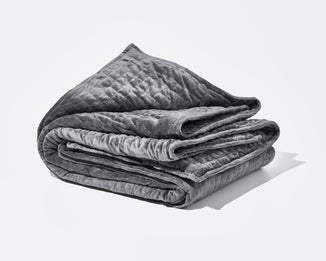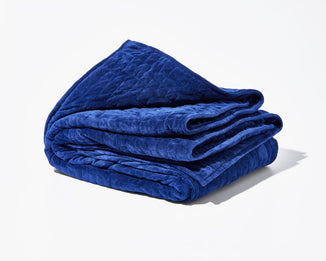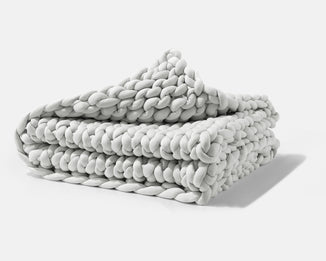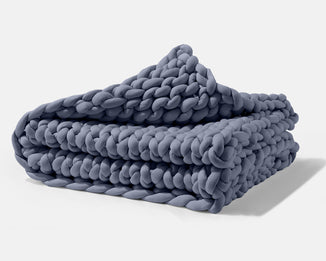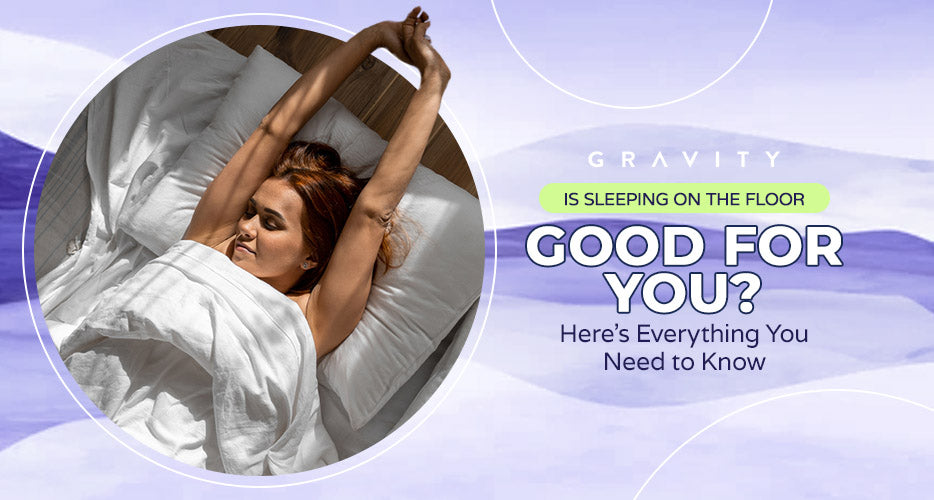
Sep 22, 2022
Is Sleeping on the Floor Good for You? Here’s Everything You Need to Know

In Western societies, sleeping on an ultra-plush mattress with multiple comfort layers is often considered one of life’s simple pleasures. But this cozy sleep setup is a relatively recent development — and one that stands in contrast to the more minimalistic sleep environments of many non-Western countries. In many cultures, sleeping on the floor is the norm.
Japan is perhaps the most well-known example of a country where floor sleeping remains popular among citizens. There, the majority of Japanese sleep on soft mats traditionally filled with natural materials like rice straw. These mats, called tatami mats, provide a firm sleeping surface for sleepers of all ages and can be conveniently folded up and stored away when not in use.
Now, it seems that many Americans are taking a similar approach to their sleeping arrangements in the hopes of saving space and money. But is sleeping on the floor good for you?
In this guide, we’ll give you the lowdown on floor sleeping, including the benefits and drawbacks. We’ll also provide a few tips and product recommendations to help you sleep more comfortably on the floor — from Japanese futons and tatami mats to travel weighted blankets you can take with you anywhere.
Benefits of Floor Sleeping
Sleeping on the floor might not be the first thing you think about when it comes to improving your sleep hygiene, but there are some benefits to taking a minimalist approach to your bed setup. Here’s why more and more Westerners are choosing to snooze on the floor — and why it might be time for you to follow suit.

May Improve Back Pain and Posture
There is currently no scientific evidence that sleeping on the floor improves back pain and posture. However, some research has shown that sleeping on a medium-firm mattress can improve sleep quality and comfort. Chiropractors and sleep experts say that sleeping on a firmer surface is preferable, as it helps keep the spine in a neutral position. (A neutral spinal position promotes the alignment of all three spinal curves, including the cervical, thoracic and lumbar curves.) Thus, when faced with the prospect of sleeping on a mattress that sinks in the middle, sleeping on the floor might be the more desirable option for people dealing with back pain.
May Improve Sleep Quality
Again, there’s no scientific research to back this up — but plenty of anecdotal evidence suggests that you can get a better night’s sleep by dozing on the floor. In an article in Men’s Health, biomechanic expert Katy Bowman claims that ditching your super-pricey memory foam mattress for the humble floor offers numerous benefits, including deeper sleep and less pain in the morning. She postulates that sleeping without a mattress can help strengthen the tiny muscles in your body, helping to loosen stubborn knots and promoting a more restorative night’s rest.
Looking for more easy ways to achieve a deeper night’s sleep? Wind down for bed in comfort and style with our luxurious weighted robe.
Shop Weighted RobesSaves Money
Perhaps the biggest appeal of sleeping on the floor is its cost-saving benefits. Good quality mattresses can be absurdly expensive, costing anywhere from $600 to $3,500, depending on the size and brand. In contrast, sleeping on the floor generally requires nothing more than a comfortable mat, a cozy blanket and a few pillows for extra support. Moreover, mattresses have an average lifespan of approximately eight years, whereas high-quality tatami mats and Japanese futon mattresses can maintain their integrity for about 15 years or more.
Ideal for Small Living Spaces/Minimalists
Japan is a densely populated country, with 345 people per square kilometer. Homes in the Asian country are famously narrow, forcing inhabitants to get creative with how they utilize their living spaces.
One of those space-saving tricks is — you guessed it — sleeping on the floor. Tatami mats, shiki futons (shikibutons) and other portable bedding options can be easily folded up when you’re not using them, saving you a significant amount of floor space.
On top of that, their simple design is perfect for minimalists. Giant beds tend to be the focal point of the bedroom, whereas tatami floor mats and futon mattresses have a more understated appearance and can be tucked away when not in use.

Convenient for Travel
When traveling, it’s always nice to have the option of sleeping on the floor. For one thing, hotel mattresses can be hit or miss. Even though hotels are supposed to replace their mattresses every three to five years, some decide to hang onto their bedding for much longer. Inevitably, the old mattress will start to sag in the middle, knocking the sleeper’s spine out of alignment.
Instead of risking back pain and an unsatisfactory night’s sleep, many travelers prefer to sleep on the floor using the bedding they brought from home. Some travel-friendly bedding options include:
- Foldable sleep pads
- Sleeping bags
- Body pillows for extra support
- Therapeutic travel weighted blankets for on-demand relaxation

Helps You Stay Cool
Another benefit of sleeping on the floor is that it may help you stay cool during the warmer months. Hot air rises, so the lower you are to the ground, the more comfortable you’ll be when temperatures start to spike. Plus, the floor mats themselves are generally much cooler than a multi-layer mattress. Memory foam mattresses are particularly stuffy due to their dense, heat-trapping materials.
Are you a hot sleeper? Check out our cooling weighted blanket — made from premium, moisture-wicking fabrics to ensure a sweat-free snooze.
Drawbacks of Floor Sleeping
Not sure if you’re ready to ditch your giant comfy bed for a thin sleeping pad? Here’s why you might be totally justified in sticking with a Western-style sleeping setup.
Not Suited for People with Limited Mobility and Certain Conditions
If you struggle to sit down on the floor and get back up again, opt for a raised bed instead. (Note: You can still reap the benefits of sleeping on a firm surface by opting for a Japanese futon on a raised platform.) Experts also warn that sleeping on the floor might not be a good idea for people with arthritis or those who are prone to feeling cold at night.
Can Be Uncomfortable for Side Sleepers
Although sleeping on the floor is beneficial for spinal health, it’s not so comfortable for those who predominantly sleep on their side. When you sleep on your side, your shoulder and hip bone can dig into the floor, causing pain the next morning. An extra-thick sleeping pad and support pillows can help alleviate this risk.
Requires More Frequent Cleaning
Another significant downside to sleeping on the floor is that you’ll need to clean your bedding more often. When your bedding is placed directly on the ground, it doesn’t get as much airflow. This may result in mildew or mold, particularly if you live in a humid climate. Placing your bedding on the floor can also increase dust and dust mites and make it easier for insects to access your bed.
Sleeping on the Floor vs. Sleeping on a Mattress: Which One Is Better for You?
So, is sleeping on the floor good for you? Should you give up your ultra-plush mattress for a minimalist sleeping pad?
The truth is, there really isn’t any hard science to support floor sleeping. But at the same time, there’s also no evidence to suggest that sleeping on the floor is harmful. As long as you don’t have certain spine conditions or struggle to get up from the floor, there’s no reason you can’t experiment with floor sleeping. If you have any concerns, though, consider scheduling an appointment with your doctor.
How to Sleep on the Floor Comfortably: Tips and Product Recommendations
Giving up a giant comfy bed for the humble floor might sound like a recipe for poor sleep, but with the right tools and tips, it can be surprisingly comfortable. Here’s how you can start sleeping on the floor comfortably to rack up more Zzzs.
- Know Your Options – If you want to get a good night’s sleep on the floor, you’ll need more than just a cozy blanket and a pillow. As mentioned above, tatami mats and Japanese futon mattresses are ideal for the vast majority of floor sleepers due to their comfort and practicality. If you’re sleeping on a carpeted area, you can likely get away with using less padding (think a sleeping bag or a mattress topper). Sleeping pads and camping pads are also relatively inexpensive options to consider.
- Choose a Clean, Clutter-Free Space – Achieving high-quality rest is impossible when you have dirt, dust and pet dander swirling around your face as you sleep. That’s why choosing a clean, clutter-free spot to lay your sleeping pad is key to successful floor sleeping. The bedroom is perhaps the most logical choice because it’s already optimized for light, sound, temperature and comfort. If it’s been a while since you last gave your bedroom a deep cleaning, now is a great time to get things spic and span.
- Use Pillows for Support – Many people think that sleeping with a bunch of pillows defeats the point of floor sleeping, but that couldn’t be further from the truth. When used properly, pillows help keep your spine neutral, maximizing comfort and increasing your likelihood of waking up refreshed. Indeed, support pillows are particularly beneficial for floor sleepers who favor the side sleeping position because they can relieve pressure on their joints. If you’re a side sleeper who wants to try floor sleeping, consider sleeping with a J-shaped body pillow. This popular body pillow goes between the legs and over one shoulder, alleviating pressure and pain in these areas.
- Give Yourself Time to Adjust – Floor sleeping isn’t something you get used to overnight. Most people who sleep on the floor say it takes at least a week to adjust mentally and physically. Take it slow by napping on the floor a few times a week. You can also ease into it by sleeping on plush bedding and slowly removing layers until you reach your desired padding level.
- Clean Your Bedding Regularly – If you do decide to sleep on the ground, there are a few important cleanliness tips and best practices you’ll want to follow. In addition to regular dusting, sweeping, vacuuming and mopping your bedroom floor, you’ll also want to air out your bedding at least once a month — more often if you live in a humid environment. Otherwise, mold and mildew will start to grow underneath, which could potentially cause health issues. And don’t forget to clean the bedding itself! Tatami mats, Japanese futons and weighted blankets all have special washing instructions, so make sure you read the care label before you pop them in the wash.

The Takeaway
As you can see, floor sleeping has an array of potential benefits. Many people praise floor sleeping for its potential to save money and space. Others say it helps alleviate their back pain and improves their posture, though science doesn’t back these claims. If you think it may improve your sleep quality and health, there’s no harm in experimenting with different floor sleeping methods.
Regardless of what surface you’re sleeping on, Gravity Blankets is here to help you get your best sleep yet. Check out our entire line of sleep-inducing products — from weighted eye masks to our best-selling weighted blankets. A better night’s rest is one click away!
Image Sources
fizkes/Shutterstock.com
Jacob Lund/Shutterstock.com
Evgenia Kulikova/Shutterstock.com
Aleshyn_Andrei/Shutterstock.com
Your use of this website, its content, and any products obtained through this website is at your own risk. This website, its content, and any products obtained through this website are provided on an “as is” basis, without any warranties of any kind, either express or implied, including warranties of merchantability, infringement of intellectual property, or fitness for any particular purposes. No warranty or representation is made with respect to the completeness, reliability, quality, or accuracy of this website or its content. This website, its content, and any products obtained through this website do not constitute medical treatment and is not a substitute for a medical examination or diagnosis. If you are dealing with a health condition check with your health care provider before using. This website may contain affiliate links that allow us to earn a commission on purchases made through such links. We may accept forms of advertising or sponsorships in connection with this website. There might also be paid topic insertions. We may accept and keep free products, services, and other forms of compensation from others.
